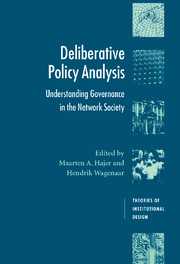Book contents
- Frontmatter
- Contents
- List of contributors
- List of figures
- List of tables
- Preface
- Introduction
- Part I Policy conflict and deliberation in the network society
- Part II Rethinking policy discourse
- Part III Foundations of deliberative policy analysis
- 7 Beyond empiricism: policy analysis as deliberative practice
- 8 Accessing local knowledge
- 9 Theoretical strategies of poststructuralist policy analysis: towards an analytics of government
- References
- Subject index
- Author index
7 - Beyond empiricism: policy analysis as deliberative practice
Published online by Cambridge University Press: 22 September 2009
- Frontmatter
- Contents
- List of contributors
- List of figures
- List of tables
- Preface
- Introduction
- Part I Policy conflict and deliberation in the network society
- Part II Rethinking policy discourse
- Part III Foundations of deliberative policy analysis
- 7 Beyond empiricism: policy analysis as deliberative practice
- 8 Accessing local knowledge
- 9 Theoretical strategies of poststructuralist policy analysis: towards an analytics of government
- References
- Subject index
- Author index
Summary
Why has policy science failed to generate a significant body of knowledge capable of playing a significant role in solving the pressing social and economic problems that confront modern urban-industrial societies? An important part ofthe answer can be traced to discredited, but often still operative, empiricist epistemological assumptions. Drawing on newer developments in epistemology and the sociology of science, the discussion outlines a postempiricist conception of policy science designed to address the multidimensional complexity of social reality. As a discursive orientation grounded in particular reason, the approach situates empirical inquiry in a broader deliberative, interpretative framework. More than just an epistemological alternative, the postempiricist approach is offered as a better description of what social scientists actually do in practice. The chapter closes with a brief discussion of the implications of the approach for both a socially relevant policy curriculum and deliberative governance.
The social sciences emerged in the main as an effort to develop a rigorous empirical science patterned after the methods of physics and the natural sciences. Today all but a few diehards are willing to admit that this ‘positivist’ programme has failed to pay off on its promises (Giddens 1995; Lemert 1995; Wallerstein 1996). The social sciences neither have developed anything vaguely resembling the promised causal, predictive ‘science’ of society, nor has their subfield, the policy sciences, been able to provide indisputably effective solutions to pressing social and economic problems (Baumol 1991; deLeon 1988).
- Type
- Chapter
- Information
- Deliberative Policy AnalysisUnderstanding Governance in the Network Society, pp. 209 - 227Publisher: Cambridge University PressPrint publication year: 2003
- 33
- Cited by

